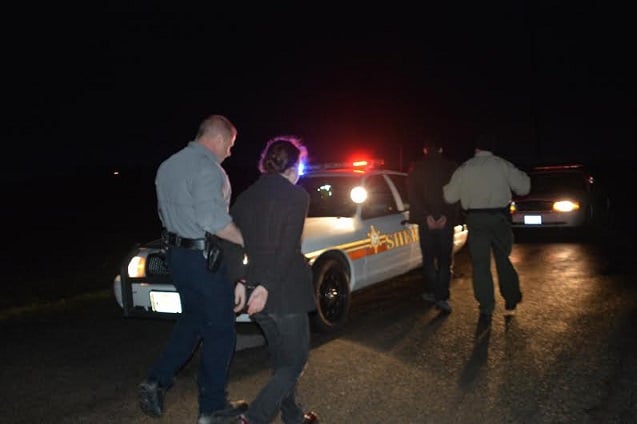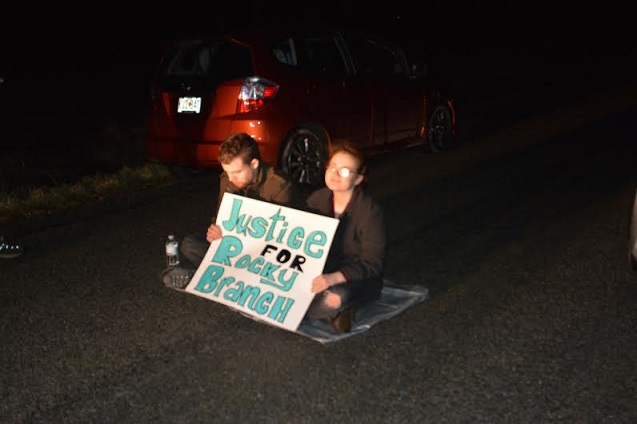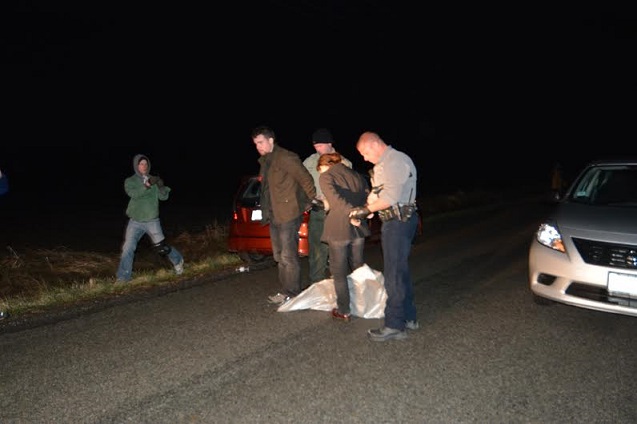
 Police escort to their cars, two Ohio activists under arrest for a blockade intended to stop logging along Rocky Branch Road, a precursor to Peabody Energy’s strip mining expansion and the closure of the road planned by the company. (Photo: James Anderson)
Police escort to their cars, two Ohio activists under arrest for a blockade intended to stop logging along Rocky Branch Road, a precursor to Peabody Energy’s strip mining expansion and the closure of the road planned by the company. (Photo: James Anderson)
Activists courted arrest recently in Harrisburg, Illinois, to stop Peabody Energy from continuing logging operations related to strip mine expansion.
Police arrested two activists at a blockade set up on Rocky Branch Road in Harrisburg, Illinois, early on March 28, 2014, to stop Peabody Energy from continuing logging operations as part of the company’s strip mine expansion.
Daniel Goering, 20, and Alice Fine, 19, laid down a tarp on the road to block the route to be used for logging that day. Along with other environmental activists and with the support of community residents directly impacted by Peabody’s operations, the two tried to forestall and possibly prevent further strip mining and the proposed closure of Rocky Branch Road.
Goering and Fine – a self-identifying “radical power couple” – are students at Oberlin College in Ohio who joined with other activists intent on stopping Peabody, the largest private-sector coal company in the world. It has been active in mining operations around Harrisburg since 1999.
 Two activists from Ohio sit in the middle of the road to support justice for residents in the Rocky Branch community in Southern Illinois faced with the consequences of Peabody Energy’s strip mining expansion. (Photo: James Anderson)
Two activists from Ohio sit in the middle of the road to support justice for residents in the Rocky Branch community in Southern Illinois faced with the consequences of Peabody Energy’s strip mining expansion. (Photo: James Anderson)
The arrest came on the heels of a Saline County board meeting the evening of March 27, at which Peabody sought approval for the closure of the road, a precursor to strip mine expansion in the area.
The board decided to postpone a decision on the proposal to close the road until April 15 because of uncertainties regarding a temporary emergency road route.
John Keller, Peabody operations manager, said he did not have authority to ensure an emergency road would be built and that it would have to come from the Illinois Department of Transportation.
Keller provided Peabody’s rationale for wanting to close Rocky Branch Road, and he explained the company’s proposed long-term road relocation.
“It’s not only reasonable but plausible that everyone involved with this can coexist,” he said.
He said at the meeting that prior to elimination of the old road, a new road would be built.
Residents in attendance and the board corrected Keller, noting that the new road would not be finished before the old road is supposed to be closed.
Approximately $15 million or more of commerce relies on the existing road, according to residents.
Residents already said they did not foresee the deleterious effects Peabody’s actions would have on the local ecosystem when the company first arrived and offered jobs.
Keller, acting spokesperson for Peabody at the board meeting, mentioned the 200 jobs his company’s mining work affords the community. Multiple residents and speakers rejected those claims, suggesting them to be spurious at best.
With credit refinancing, Peabody finished the year with a total liquidity of $2.1 billion and $444 million cash, the company’s 2013 annual report stated. Company employees and communities affected by Peabody decisions have not always fared as well.
Miners working for Peabody at other Illinois sites previously fought to unionize and avoid layoffs. After a worker died in a Nov. 17, 2012, accident, Peabody announced it would close the Willow Lake Mine in Equality, Ill., also in Saline County. A little more than a year prior, workers had won the right to collective bargaining when Cecil Roberts, president of the United Mine Workers of America, called on Peabody “to finally accept the rule of law, sit down with its workers and negotiate a fair and equitable contract for both sides,” as stated in a September 2012 UMWA press release.
Judy Kellen, 74, a Rocky Branch Road resident since 1976, said Peabody’s promise of jobs and the downplaying of consequences of mining operations made it seem like an acceptable proposal when she first served on the township board 15 years ago.
 Alice Fine and Daniel Guering (seated) risk arrest with sign-holding activists standing behind them in the middle of Rocky Branch Road in Harrisburg, Ill. (Photo: James Anderson)
Alice Fine and Daniel Guering (seated) risk arrest with sign-holding activists standing behind them in the middle of Rocky Branch Road in Harrisburg, Ill. (Photo: James Anderson)
Kellen said she did not realize at the time a “cancer had just entered our township.”
She and her husband, Glenn, aimed to be as self-sufficient as possible when they moved to Illinois several decades ago. They raised chickens, stocked their pond with fish, planted orchard trees, kept gardens and grew vegetables from asparagus to Swiss chard.
Peabody’s plan endangers that subsistence lifestyle and local life in general, she said.
Kellen said “big orange dust clouds” and a pungent sulfurlike smell permeate the area far too often as a result of Peabody’s work. She said that not only her gardening but some of the farming other nearby residents do could be poisoned by the coal company’s externalities not factored into their decisions to accelerate mining activities.
The Mine Safety and Health Administration previously investigated problems at other Peabody mines. The coal company refused to turn over accident, injury and illness data, a 2011 MSHA news release stated.
Having witnessed some of this firsthand, Harrisburg residents worry about renewed and intensifying operations in conjunction with the Rocky Branch Road closure Peabody is requesting.
Kellen said the road proposal would cost residents in gas and time. The proposal “is kind of putting our house in peril,” she said. Small fissures in the infrastructure now were not there before Peabody started, she said. The cracks and problems with doors shutting started the same time Peabody did, which Kellen said is surely not a coincidence.
A Peabody operations plan document regarding procedures and methods for the Rocky Branch Mine and planned engineering techniques to be used in other locales, states that if “event holes are discharging water containing acid or toxic forming materials, it shall be sealed within 72 hours after completion,” leaving a three-day window wherein noxious emissions can spread.
Although the Saline County board voted to wait until April 15 to make a decision on Rocky Branch Road, logging carried out by a company Peabody has contracted continues apace for at least several days.
Georgia de la Garza, a longtime human rights and environmental activist, said the aim of the action, which she supported, was to show the Saline County board that the residents can make – and many have made – their own decision without having to wait for a special representative meeting to address only partial concerns.
“Our decision is that Peabody cannot have our roads,” she said.
The Indiana bat – a federally listed threatened species that roosts in the woods recently cut down – is threatened by the logging for strip mine expansion, she said. An 84-year-old man in poor health lives with his wife, who is suffering from dementia, near the woods and land being severely impacted in the protracted process.
“Peabody’s motives are not just to do strip mining around these residents’ homes that are left here,” de la Garza added. “Their goal is to mine this whole area. They have a very long-term plan of strip mining about 1,200 more acres in this area.”
Kellen, who said she heard from a fellow Saline County resident at the board meeting that Peabody employees wanted to take her out for so vocally opposing their plan, referred to the action involving the arrest of Goering and Fine as literally part of the fight for future generations.
Despite Peabody using equipment locals consider too heavy and too large during the course of past work around Rocky Branch Road, Kellen said, the company higher-ups have not been arrested, while the two young adults were.
“Yes, the kids were breaking the law, but so was Peabody,” Kellen said, adding that the activists did it “to preserve their future,” and in solidarity with local resident resistance.
Goering, one of the two arrested, is originally from Evanston, Illinois, and is studying cinema at Oberlin. He said he was in St. Louis for a week working on environmental activism when he learned of the Rocky Branch Road situation.
“My understanding coming in was that there’s this road in the area that people really relied on that was going to be destroyed for coal mining and people were mad,” he said.
After hearing from the community at the Thursday board meeting, he said he came to understand why people were so upset.
It was clear that those living around Rocky Branch “were excited and would be energized by this kind of an action, and they’ve been expressing that it’s generating excitement and attention,” Goering said after he and Fine arrived in Saline County and spoke with concerned residents such as Kellen.
Fine, a Latin American studies major at Oberlin, said she heard about Peabody’s plans for Rocky Branch in the context of anti-fracking work. After learning more, the situation appeared intimately connected to the work she and Goering do in Ohio. It was a situation in which they both could help the community, she said.
“I had been thinking about my position as a young person with a fair amount of flexibility and enough privilege to be able to take an arrest,” she said.
She said being able to take an arrest in such a situation when others might not be able to appeared a key area where they could contribute.
 Police put cuffs on Alice Fine and Daniel Guering, two activists arrested trying to prevent continued logging in preparation for strip mining in Illinois Saline County where local residents are cultivating a broader community of resistance. (Photo: James Anderson)
Police put cuffs on Alice Fine and Daniel Guering, two activists arrested trying to prevent continued logging in preparation for strip mining in Illinois Saline County where local residents are cultivating a broader community of resistance. (Photo: James Anderson)
After refusing to move from the tarp the two were seated upon in the middle of the road, the two exchanged a kiss before being cuffed and put into the car.
They were kept for roughly two hours in the Harrisburg County jail. Fellow activists promptly posted bail to get them out.
“Certainly this isn’t over after just our arrests,” Goering said after being released.
A good group of people from around the Midwest and beyond have “attached to this struggle and are connected to it,” he said.
Fine said the salience of the intertwined work, from Ohio to Illinois, as well as the importance of the affective bonds built up through collective and direct actions, bodes well for people, if not for Peabody’s profits.
“Southern Illinois is going to be a battleground for a while, and it’s exciting to be able to get in on that,” she said.
We have 10 days to raise $50,000 — we’re counting on your support!
For those who care about justice, liberation and even the very survival of our species, we must remember our power to take action.
We won’t pretend it’s the only thing you can or should do, but one small step is to pitch in to support Truthout — as one of the last remaining truly independent, nonprofit, reader-funded news platforms, your gift will help keep the facts flowing freely.